Day 2 was supposed to start with the guys from Bioware (part EA) with
Creative Game Development: How we do it at Bioware with Dr. Ray Muzyka and Dr Greg Zeschuk.
However there was just one of them. It was quite a rock and roll start for Greg to have to apologise for Ray not being there but he had managed to get himself into the last 500 of the World Series of Poker.
Greg went on to give what was probably an unusual kind of corporate business talk but with a successful and creative game spin to it. As you can see from the pictures if you have ever sat through a corporate powerpoint presentation its pretty much like this. Note the “Interesting Learnings” title.
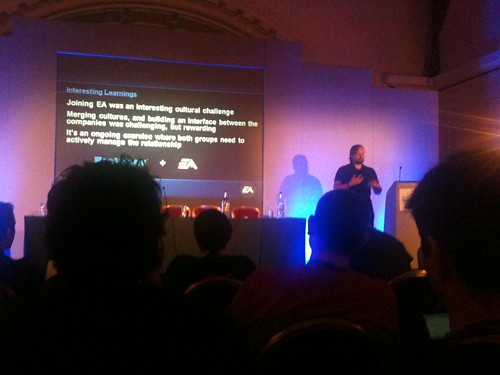
Having said that it was interesting to see how a small company grew to become a larger one, then get bought by EA (a huge one), then have to merge in other smaller studios under the Bioware brand across multiple locations.
Greg was very articulate and passionate about establishing the culture and the values of a company. (He admitted they had gone off to do MBA’s which explains the ppt). However I think this was not just lip service. I have heard many a corporate spiel on values and been left feeling it was convenient to say those things without backing it up. Equally I have heard, and given, talks with the same true belief in the power of teams and of people.
He indicated that as evolution occurred the culture and people and processes had to adapt but try and stay around the core values. As he also said, this is all obvious but many people do not spend time to consider the structure, who they are and what their way forward is. It sounded as if they had taken a decision early to make sure they both hired for the culture and also indoctrinated the values into those people (in a good way). That formed stronger bonds.
I am not sure who in the audience was into what he was saying though. I was expecting some flashy bang whizz creative explosion on stage, but instead got a very good, very sensible and very articulate presentation on organisational structures.
Next up:
Ed Vaizey : Minister for Culture
It was apparently a new thing for a minister to come and talk, and with all the budget changes little things like tax breaks for the video game industry (another discussion that one) getting dropped there seemed to be some nervousness amongst the organisers that this would all kick off some how. Several intro’s suggested how brave and noble it was for Vaizey to risk turning up. I found that a little patronising to say the least. Vaizey tends to have been a supporter of games and his opening remarks were how the industry attracted people from the “difficult subjects” of computer science, engineering and maths. On a personal note it was hard to listen to him and not think he is like Boris’s coherent brother.
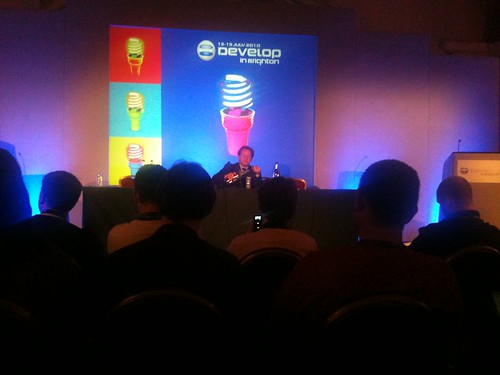
Anyway he read a load of facts and figures, announced some £2million fund out of Abertay for gaming startups, and Ian Livingstone heading up a study or panel on games development education and if it was working. The rest was really just spin, NI contributions, Conservatives good for business etc.
He then sat down and took some questions. Though I do not think there were any specific important answers though somehow it got onto immigration.
He was asked what game he is playing at the moment. There was a ripple of laughter from the audience which may have been the outlet for the sit still children we got at the start. Apparently he is playing “Super Mario on the Wii as that is the limit of what he can do”.
He said he was passionate about the industry, but then he has said that about other things as its a great non action word. He also sang the praises of George Osborne which I suspect was because the whole thing was on TV for the politics show.
The Future IS (changed to Of) Controller Free Games and Entertainment
George Andreas – Changed to Nick Burton of Rare
This was a pitch about Kinect. Rare are close to Microsoft and really the pitch started as a history of what Rare had done and tried out over the years to show they were not simply jumping on the Kinect bandwagon. That may be a little unfair, and certainly Rare have shown a great deal of innovation and cool things over the year, so it may have been part of the corporate theming of the pitch.
Nick recounted some interesting gaming moment from Rare. Including some home brew attempts at the wand approach (way before Sony’s Move)
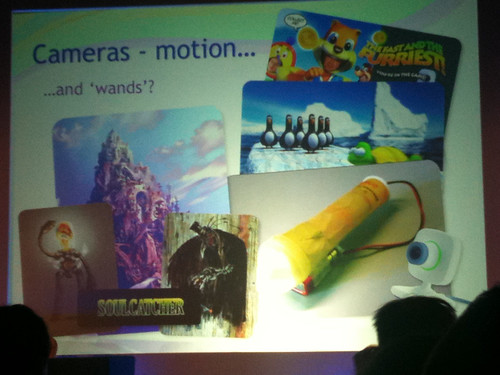
Nick then wen on to talk about Powergloves and a few choice gaming moments, Kameo as a launch title on the 360 etc. The challenged of developing on hardware that is a moving target.
This led onto the core of the pitch. Using Kinect to make a sports game. By getting 3 willing volunteers up on stage and asking them to run on the spot he showed how it is hard to determine what a running movement actually is. Tight arms in knees up running and a sort of Manchester waddle of running being two extremes.
He then went into some depth about altering gameplay and the essence of a game to fit with a comfortable way to play. This centered around football (as in soccer). Running and navigating a 3d pitch whilst possible turned out not to work well from an experience point of view. The essence of football seemed to them to be the set pieces and the kicking of the ball. The long and short of it is really to make football a bit like netball on Kinect. You kick the ball with your body, but don’t run around simply turn your shoulders to face the player you pass to. This is a very practical approach, and clearly one they had to think through. It does make an interesting trade off bit will make the game much simpler to play. Though we will have to wait and see as this was only a video not a live demo.
Homespun Fun – The Art of Kahoots – Ricky and Nat of Honeyslug
This pitch I have already sung the praises of in its own post here. Very much my favourite session of the whole event still.
The Edge Panel – Character Building : Avatars for a User-Generated World
Alex Wiltshire – Edge, Jack Oakman – Realitime Worlds(APB), Jorge Sanchez – Lionhead Studios (Fable2 &3)
Alex opened up the panel bu saying there was a huge rise in user generated content in gaming. Modding etc having driven it forward. He cited Second Life (though he accidentally called it a game, and used Anshe Chung as the reference for making money), World of Warcraft 3d prints (the only mention all conference of that tech).
The panel then discussed the challenges in what are AAA games from a visual design perspective of providing either the tools to create content or huge combinations of rich content that all fit together. Problems of the exponential testing process to make sure one piece of content worked with another.
Fable has a very different approach to APB as they are different styles of game. Fable puts the customization in context of the story, APB uses a more “prim” or sticker based approach to customizing characters and cars to create gangs, stars and quality creations.
One point that interested me was that when asked about making entire worlds not just characters customizable the panel were obviously answering from a cohesive design perspective to say its was impossible to do. Obviously the SL and opensim’s of this world and a good few other platforms are about the entire thing being user generated. If you are a games visual designer and providing a quality game experience the laggy complexities and hacks of a virtual world will not appear on your radar. However… they should as they are starting to solve some of the huge problems that occur in distributing and allowing such creations.
I asked if they expected to have to provide moderation tools for users, i.e. if users wanted to have an authentic experience with great visuals could then suggest that clowns and bad art not be allowed. Its a complicated issue and one that I was not suggesting was automated. The general answer seemed to be clans, but of course that does not help the above clan issue, the land management we see in SL and parcel entry and “rules” people apply or try to in order to keep an experience how they would like it. I cited the role playing of deadwood that requires you change avatar to enter and stay in character. Odd that many people in the games industry are unaware of this side to “gaming”. Still I like APB and Fable so was not going to harp on too long about it. @wonderlandblog and @doctoe were also there so it was good to see some friendly faces despite the odd spotlights in the room.
Panel: The Rise of the Microstudio
Will Freeman : Develop
Sean Murray Hello games (Joe Danger PS3)
Mark Morris Introversion
Robin Lacey BeatNik
Cliff Harris Positech
I really wanted to hear how these guys saw the industry. Such a wide set of experiences. Cliff is a one man army, publishing and promoting as well as building his own games, Robin went from no experience to VC funding and does work for Channel 4, Mark was self funded and with a bunch of friends got going and Sean has recently had massive success but nearly folded and sold his house to keep Joe Danger from going under.
Having come from enterprise myself, now starting out on my own it was great to see we all go through the same stuff. Cliff had used mainstream jobs to keep him going, and was the most passionate about his market.
They guys all got on as they all understood one another’s war stories. Though as the thing went on a late arrival stirred things up a bit, and in a bizzare way. Mark Rein of Epic popped in sat at the front and interjected at how wrong indies were to talk to individual users. Advertising the heck of of everything is the only way. What I found amusing though was that this was kind of a “don’t you know who I am moment” from him, and clearly some of the panel didn’t, which is brilliant. The best post on this was from Cliffski himself *
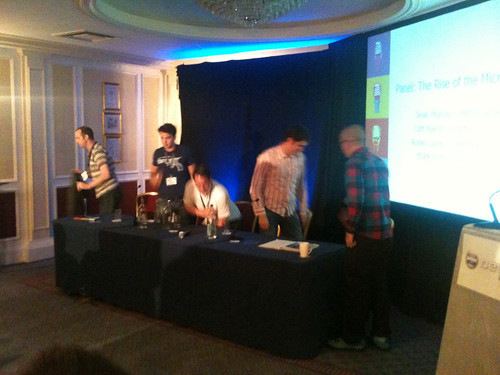
For me it was a ridiculous corporate haranguing in a forum that was about individual personal experiences that really could not be argued with. I know from experience that with a direct approach and engaging with people and meaning it you can get a heck of a lot done. Thats not to see the big guys can easily do that, in fact they are not geared up to do that, but it can make a huge difference. That is the point that was missing for much of the industry still. People are connected, they are bypassing large structures and organising in a different way. The four guys on the panel proved that works as much in the games industry as any other.
****UPDATE To his credit Mark Rein issued an apology and explanation via Develop and to @cliffski. That takes some doing and maybe show there is some interesting middle ground, though small indie and large corporate live by different rules very often.
Anyway after all that many of the key players in the industry went off to an awards dinner where Unity3d got 2 awards including the Grand Prix 🙂 David Helagason was saying as he went off to it he was very nervous, but I am really pleased they did win as they are the shake up the industry needs. Well done to Channel4 for their use of education gaming and getting the hero award too. Brilliant stuff.
Day 3
Successful, Creative, GSOH
Tim Shafer Double Fine
A brilliant opening keynote. Tim is a veteran of the industry and created recent games such as Brutal Legend and before that Psychonauts. However for me he is the creator of Full Throttle and hence can stand up and say whatever he wants. I was not let down as he shared stories in a completely relaxed and suitably irreverent way. In fact the story started with he recounting seeing someone happily vomit in the hotel corridoor on the way back from the bar, without breaking stride. As he said, all these years he has been going wrong being sick in how own room.
He talked about how hard it is do deliver successful multi million dollar games to publishers who quite often will cancel a game in a company reorg. He also talked about how, for some people, to be so into a game development for 4 years may not be a suitable creative outlet.
One of the things he did with his people at his company was take an “amnesia fortnight”. They all went off and did a game jam, 4 teams just came up with 4 ideas and got on with it. Those 4 ideas got parked as they went back to the big development. The team were enthused and sparked and bonded. As it turned out down the line those became the start of a new era of development for the company, working on smaller titles but more of them. So once again small was the new big.
His tales of working with Tim Curry, Jack Black and Ozzy Osbourne were interesting too. He had been warned they were hard to work with, as most stars are. However he found when they were all creating things they all got into it and were great, people just got stand offish when a suit or marketing/PR person arrived in the room 🙂 That rings a few bells.
Time clearly loves his craft and I can see that would permeate any project he was working on. He dealt with some odd questions too, and also got hassled about the fact he had given an interview the day before where he had made a derogatory comment about a leading executive on the production side of the industry. It seemed the crowd were with him on those comments though 🙂 It was a great talk and another inspiration.
3D: The Next Dimension in Gaming
Mick Hocking, SCEE
This presentation was what it said. An exploration of 3D television and displays in gaming, heavily focussed on Sony of course. It was held in a room with a very unusual ceiling. I used this photo as obviously pictures of 3d tv just doesn’t work 🙂
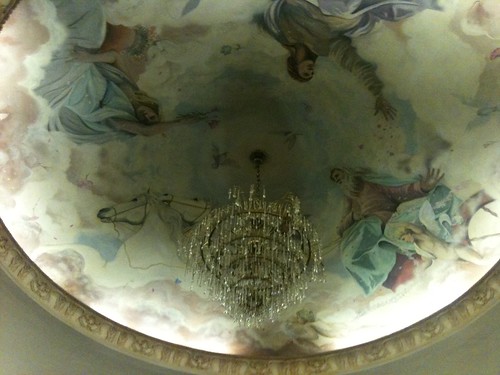
The presenter did a history of 3d, i.e. its been around as long as photography. This quickly zoomed towards the types of polarized and shutter based technology used on screen. The Sony TV’s seem to be active shutter glasses so hence it was indicated this is better as unlike polarized lenses it does not use have the scanline for one image and half for the other.
He explained some of the design and comfort decisions that Sony help people deal with in games. In particular knowing the size of the screen is important. Large to small works, but the other way around the vergence of your eyes when still focussed on the plane of the screen can get painful. i.e. it makes you go too crosseyed. Also with a HUD on the surface of the screen the things in the game can come out and over lap the HUD.
Sony had brought 2 3D screens, stacks of glasses and had the PS3 running some demos. I watched a few seconds of a racing game. As I suspected games are much better than films in this respect. Your brain is ready for the thrills and spills and it was instantly interesting and engaging.
Finally:
Fable III :Story, Cast and Simulation
Peter Molyneux : Lionhead Studios.
Peter turned up a little late but got a live Fable III demo set up. He explained quite often the things that were appalling (his words) in Fable II and how much better Fable III is. To be expected I guess. Still it was good to hear the removing of 2d interfaces, replacing with in context game metaphors such as levelling up being a journey on a road. Also the fact that multiplayer will be a bit more social. As he explained you can meet and marry in world, buy a house together etc. This got a sort of nervous but derisory laugh from the audience, but that sort of engagement is what works in virtual worlds? Not just the very enjoyable fighting and fragging.
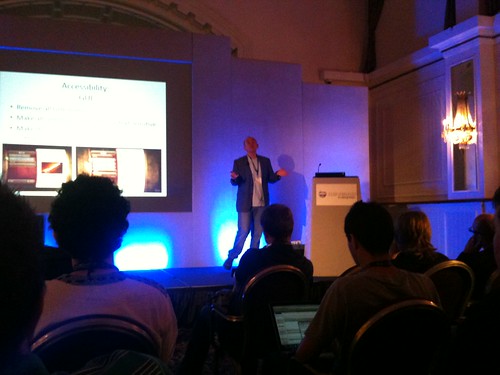
Peter has a lot of critics for being full of spin, but I do like his style and his games are very inventive and enjoyable. Having met and talked with him about virtual worlds and UGC I have a feeling he is on the verge of getting what is going on in the web today, the meet and marry comment alluded to that. However this is still AAA gaming as an industry and it has its patterns and intertia. Seeing the dev version of fable and the hints of LUA scripting etc were quite interesting too. Having cinematics play but Peter saying he was not happy with that move and its being changed etc all good insights.
A very full transcript was taken by Dan Hon, who it was great to see again and who I sat next too through this.
With that I called it a day and came home from Brighton. More enthused than annoyed. Still frustrated the industry is missing out on something rather amazing in virtual worlds, virtual goods, UGC, but also very happy they are not as that give me room to do what I do in this industry too and maybe change it around a little with some of my projects.
Finally I can reveal that the typo on the badges for Evolve was not in fact product placement by CCP as I first thought.

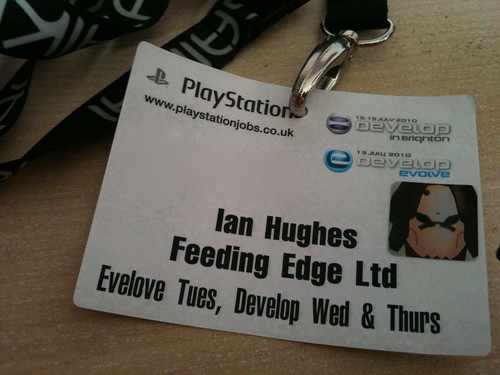
I love your writing style really loving this internet site. “We must use time as a tool, not as a couch.” by John Fitzgerald Kennedy.